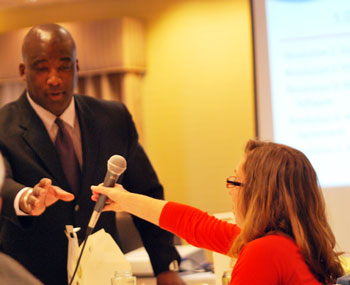AATA Board OKs Key Countywide Documents
Ann Arbor Transportation Authority board meeting (May 16, 2012): At a gathering that combined a retreat with a regular monthly meeting, the AATA board voted on business items necessary for a possible eventual transition of the AATA to a broader countywide governance structure and expanded service area.

Michael Ford, CEO of the Ann Arbor Transportation Authority, handed the microphone around to board members at a May 16 meeting so their commentary could be more easily heard. Board member Anya Dale had just finished speaking. (Photos by the writer.)
The two key documents approved or endorsed by the board were the articles of incorporation for a possible new transit authority, and a four-party agreement establishing a framework for possibly transitioning AATA to that new authority – now with the working name of “The Washtenaw Ride.” The four parties to the agreement are the AATA, Washtenaw County, the city of Ann Arbor and the city of Ypsilanti. [.pdf of articles of incorporation]
Board action came in the context of various unknown factors, including continued federal funding, pending state legislation on a regional transit authority for southeast Michigan, and the number of Washtenaw County municipalities that will participate in a possible countywide authority. Another uncertainty relates to the status of the four-party agreement, which the Ann Arbor city council approved on March 5, 2012, after amending (several times over multiple meetings) the version that the AATA had first presented.
A wrinkle emerged on May 15, 21012, when the Ypsilanti city council approved the four-party agreement, but amended it in a way that requires reconsideration by the Ann Arbor city council. In response to an emailed query from The Chronicle, mayor John Hieftje indicated that the four-party agreement would be back on the Ann Arbor council’s agenda for its June 4 meeting. [.pdf of red-lined four-party agreement as amended by Ypsilanti city council]
The Ypsilanti amendment relates to a 1% municipal service charge that the agreement originally allowed the two cities to impose on their millages, before forwarding the millage money to the new transit authority. The Ypsilanti council struck the municipal service charge from the agreement. At its Feb. 6, 2012 meeting, the Ann Arbor city council had already contemplated – and rejected, on an 8-3 vote against it – an amendment of the language related to the municipal service charge.
Balanced against that set of uncertainties was a generally very optimistic tone during the meeting, with board chair Jesse Bernstein indicating that he felt that no matter what happened on a variety of fronts, the AATA was well-positioned for the future.
Bernstein and the board’s optimism was based in part on positive reports on several fronts. The doubling of frequency on the Ann Arbor-Ypsilanti Route #4 has resulted in 20-25% ridership gains on that route. The new Ann Arbor-Detroit Metro airport service had double the number of passengers in the last week of April compared to the first week of April, when it was first launched. AATA’s vanpool service is poised for implementation. And results of a survey conducted on board AATA buses late last year indicate a high level of customer satisfaction among AATA riders.
On the budget front, AATA controller Phil Webb also delivered positive news, in the context of an approved budget this year that was expected to absorb additional expenses in order to pay for some of the new service initiatives. Through the first six months of the fiscal year 2012 (which began Oct. 1, 2011) the AATA is under budget by around $500,000. The board had approved a budget on Sept. 15, 2011 that called for tapping fund reserves for $1 million. Now, Webb said, the AATA could finish the year breaking even, depending on how things play out in the second half of the fiscal year.
The board voted to support three other resolutions at the meeting: (1) approval of a contract for vanpool and rideshare matching software; (2) approval of a contract for construction of additional bus shelters; and (3) approval of revisions to the AATA’s procurement manual. The board also got updates on a number of other projects, including the construction of the new Blake Transit Center in downtown Ann Arbor. [Full Story]



